ANECDOTES ABOUT BEZIERS
December 20th, 1615 : Abortive Invasion of the Lord of Rohan's troops
In this evening of December 20, the sentinel positioned on the Béziers's ramparts sees, through the moon light, a troops' movement getting closer to the city's bulwarks. The captain of the guards is then warned. Not wishing to alarm the population at once, he decides to use guile to surprise the enemy. For that, he asks to a dozen of his soldiers to go to bring back the St Aphrodise's camel (its effigy which one usually takes out during the Ascension's holiday), which is inside the abbey's saint.
The camel, intended to frighten the invader, is hoisted on bulwarks to be able to be seen as soon as the enemy will get closer. Already, twenty or twenty five enemy soldiers, of the most fearless, begin to position ladders along ramparts. The Captain gives then the order to raise the camel above the wall and orders to give it an undulation's movement. The vision of this "monster" stops down the enemy's ascent, frightened by this supernatural apparition.
Taking advantage of this moment of terror, the captain orders to fire with muskets, at the poor aggressors and to throw stones on their ladders. Around thirty of them fall down under the projectiles. The rest of the troop, terrified and disorganized, flees with confusion and under the laughingstock of the Biterrois soldiers. The troops of the citadel, alerted by the noise, use their cannons to show they did not sleep and two thousand armed people crowds on ramparts definitively terminating this failed invasion. source (only in French)
June 8th, 1912 : Great scandal of prostitution
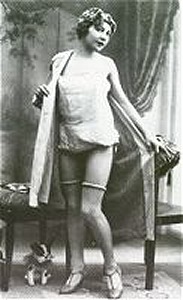
This year, an enormous scandal shakes Béziers. "A grave affair of mores" headlines roughly "le Petit Méridional" of June 8. Underneath, an enticing subtitle: "75 girls and very little girls prostituted - the confessions - 7 arrests."
The place of the crime : the Villa of Arts; facts : procurers solicited everywhere for girls "prostituted or still pures" and brought them to the aforementioned Villa of Arts "where scenes of nauseating orgies occurred".
But the police looked after.
The story tells the fine discovery of the ballets roses : civilian dressed agents (ho the cunnings!) introduce themselves at the aforesaid villa.
They are - says the journalist who knows very well the job - received by the manageress with an excessive kindness. She believes - how stupid she is - these guests are serious customers.
"The agents' shaved faces inspire to her an absolute confidence"; next : arrest, scandal. The affair is so important that some, in Béziers, begins to tremble. 13 year old "debauched" girls, that can cost a lot.
In fact, the police throws a chaste veil on the clientele : five procurers and three women are arrested of which "the supplier" elegantly nicknamed "Jojo the Negress" who is - according to rumours - hardly known on the Allées Paul Riquet where she is engaged in activities the morality disapproves.
About the remainder : silence. "The police researchs", the newspaper says, "a Biterrois who would have spent - in the Villa of Arts - big amounts to be able to play some retrospected antique scenes - whose we prefer not to talk about - but which all were made of a very doubtful taste although they were renewed from the Classic art. Statement of the maid : "if one wants to arrest all the customers of the house, the police will have a lot to do !".
(extracts from "Le Languedoc au temps des diligences" by Jacques Durand and André Hampartzoumian)
Around 1710 : Pierre Cléric, a Jesuit, complains against the streets' insalubrity
|
Des Carmes jusqu'à Tourventouse |
From Carmes to Tourventouse |
Although today the canine excrements replace the people's ones, we can see the problem persists for centuries. Cléric clarifies that at this time it's only possible to walk in the streets by lifting his dresses, by keeping watch to the windows from where the night pots' contents are thrown on the road.
The worst was when it was raining : in Béziers, as all other Southern cities, people had the habit to defecate inside toilets arranged on roofs. As the sewer didn't exist, the excrements dried in the sun and smells were dissipated in airs. However, each time the rain was falling, all these excrements became liquid and flowed down the streets...
It is only at the Empire's period that these "aerials privats" will be destroyed by municipal ordinance.
The red paws of Sérignan
At the beginning of XX-th century, Sérignanais (Sérignan natives) still had the nickname : "Red Paws".
The supposed explanation of this nickname would result from a quality of vine: "Le Petit Bouchet".
The grape was then crushed with foot and this vine's grain, very red, tended to color the vintagers' legs.
Some others villagers' nicknames :
• ADISSAN : "Lous coquillas" (the smart ones).
• ALIGNAN du VENT : "Lous mals pinchenats" (the unkempt ones).
• BALARUC LES BAINS : "Lous Enfangats" (bathed in mud), because of medical mud baths.
• CABRIERES : "Sauta Rocs" (rock jumpers).
• CAUX : "Canalhas" (Canailles) because of Pomarèdes the bandit.
• FONTES : "Raballa sacas" (bags makers) or "manja favas" (bean eaters).
• FRONTIGNAN : "les Muscatiers" because of muscat wine.
• GRAISSESAC : "Maïssa négra" (black faces) because of coal mines.
• LAMALOU LES BAINS : "Trinquejaïres" (the drinkers, those who clinks glasses).
• LIEURAN-CABRIERES : "Lous cagarolas" (the snails).
• MONTPELLIER : "Les clapassiens" because of CLAPAS that means stone mounds.
• MONTAGNAC : "Caps plumats" literally : plucked heads, bald headed.
• NEFFIES : "Carbouniés" (Colliers).
• NIZAS : "Feniants" (idle persons).
• PÉZENAS : "Lous machous" must come from the Spanish word "machou" : mule.
• PAULHAN : "Lous escargarots", the snails, or "Manja trinas" : tripes eaters.
• SAINT PONS DE MAUCHIENS : "Pledejaïre", litigants or carping persons.
• VENDRES : "Les ventres bleus" (blue belly persons) because of the Black Death which was there at the Middle Age.
Some news from the years 1583-1584 :
It is a somber time that this one where the Duke of Montmorency and the Viscount of Joyeuse don't stop to fight each others. The campaign is invaded by bandits under or not the orders of the aforesaid two. Winters are icy, summers are hot and dryness alternates with floods. Black Death still hits. In this context, an Biterrois artisan, Louis Charbonneau, fourbisseur (gunsmith in cutting weapons), attempts to note all the different facts of his region. Here are some :
From January 1583, Montmorency cheats to rig the Consuls of Béziers' election. The same month, he poisons a captain named "Arragon", Lunel's native, in pouring poison into his leeks' soup. The Captain survives and so alerts the police. Unfortunately the police realizes he is involved in the murder of a Lyon trader with the complicity of two other scamps : Mandaille of Frontignan and Petit of Aigues-Mortes. The three thieves are executed in February in Montpelier.
On May, executions still continue : a bandit from Bédarieux, Baunnaure, is hung high.
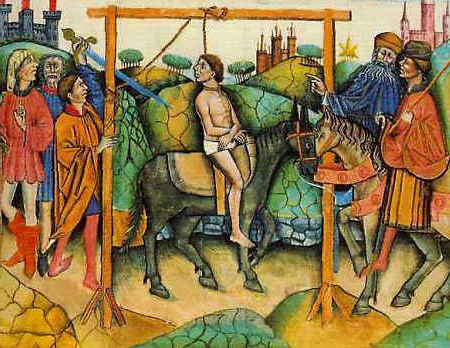
In June, in Nissan, a 15 year old young man who had fallen asleep in the suburb is devoured, during the night, by a roaming wolf.
On August 12, a woman is hung to have cheated on her husband with one of her servants. The lovers had been arrested in Florensac. The servant - who was not the first to have debauched its mistress - is condemned to be whipped then sent to the galleys.
On September 4, the bishop of Béziers embarks to Italy in... Sérignan ! This village, today in the middle of lands, was then a seaport.
The year ends by numerous affairs of armed bandits who attack cities as Lodève. In spite of executions as two bandits' ones : Lacaze of Puimisson and Benezech of Narbonne, on December 30, the armed gangs continue to teem. So, Gabian is ransacked by Janique and his "brigandaux of the mountain".
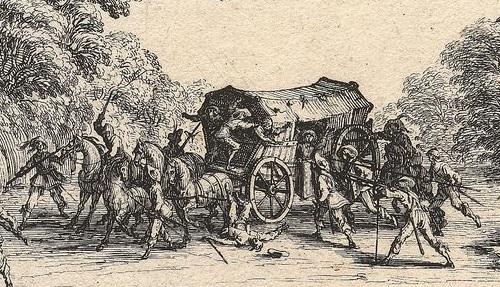
in 84, a Corsican company escorts the bishop through Béziers's streets. In the enjoyment, the soldiers fire with their arquebuses to celebrate Mgr. Thomas of Bonsi.
Result : a notable takes a shot and falls died on the stone floor. The same year, a soldier is hung to have slapped the deputy Fabri, a Béziers magistrate.
To finish, a counterfeiter's gang from Montpellier, Delettre and Fustier, is arrested following the denunciation of a woman tired to be beaten. They benefited from the Ceyras mayor's complicity who had just the time to throw into a river his corners and the molds before fleeing.
The Troubadour in love with the Countess (around 1195)
From : "Le voyageur françois, ou La connoissance de l'ancien et du nouveau monde", by M. l'abbé de Laporte, M. l'abbé de Fontenai et Domairon, 1765-1795.
This troubadour was Arnaud de Marveil, born in Perigord in the twelfth century, who, having disgusted himself with the profession of notary, devoted himself entirely to poetry. He had a pleasing figure, and, according to the text, the talent of finding, singing, and reading novels; that is to say, that he composed with ease, had a beautiful voice, and told with grace. It was enough for him to appear with advantage in the different courts of the kingdom.
The first court in which he presented himself was the Adelaide's one, daughter of Raymond V, Count of Toulouse and wife of Roger II, nicknamed Taillefer, Viscount of Béziers. This princess always took the title of countess, although her husband was only viscount, because it was then the use for women to get the title assigned to the house from which they had gone when their husband's was inferior.
The flattering reception which Arnaud received from the Countess of Béziers gave birth to the most lively and tender feeling in her soul. He expresses it himself in all his poems, if we except one:
"I did not foresee", he said, "when I arrived in these places, that I should pay so much for the pleasure of having seen so many graces and so much beauty, so much so that I feel that it is true that I do not dare to say it .... I myself have been condemned to flee the one I adore, lest my looks betray my secret: she would never forgive this indiscreet temerity.
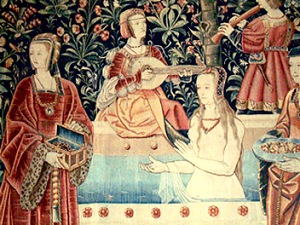
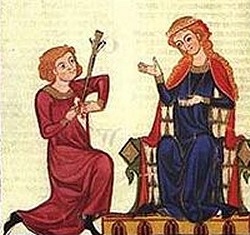
I at least have the advantage of contemplating her in my heart, which represents her to me as a mirror. Everything reminds me of her, everything depicts her to me: the freshness of the air, the enamel of the meadows, the coloring of the flowers, while retracing to me some of its approvals, invite me incessantly to sing her. Thanks to the exaggerations of the troubadours, I can praise her, I can say with impunity that she is the most beautiful lady in the universe. If they had not falsely applied this eulogy, I dare not give it to the one I love; to name her."
Arnaud indeed sang the Countess under allegorical names, and intended not to give, under his own name, the documents which he addressed to her. But Adelaide recognized the author and recognized herself in all these fictions. Far from appearing insensible to such ingeniously turned praises, she rewarded him with presents and allowed her to take her for the Heroine of his verses.
Thus the ladies of this age, in entrusting the interests of their beauty to a knight, who supported their excellence with arms in their hands, also charged a poet to celebrate them. This dual use gave rise at the same time to the novels of chivalry and the gallant songs.
Arnaud felt only the sweet honor of this commission without foreseeing the danger. He enjoyed the liberty of being at all hours with the Countess, and a few obliging words, of which she paid her poems, inflamed her soul with the most violent passion.
"My reason, he says, is against my inclination. If I believe it, it behooves me to aspire to a conquest of this importance; I must give kings the honor of sighing for her. So what ! Is it not therefore reserved for the love of equalizing conditions? Ovid has decided it: as soon as we love, we are worthy to please ... My heart, he says in another place, is well worth that of a count, a duke or a king. The elevation of his desires proves enough the nobility. It is to be equal to the sovereigns to have views worthy of them".
Some favorable looks from the countess animated the confidence of Arnaud. He should have thought that this was just a tribute paid for the use and torn by the desire to be the heroine of a poet. But he presumed that since Adelaide had not rejected the protestations of her attachment, she might finally find herself ready to answer them. He then gave a free effort to his imagination and became bolder.
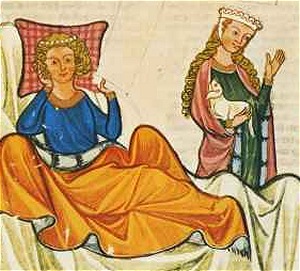
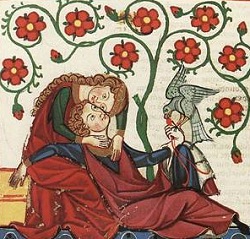
Two songs which he made bear the liveliest expression of all his desires, which he limits to obtaining a kiss from the beautiful Adelaide.
In this age of love and poetry, the talent of the poet made the distinction of ranks disappear, and the Countess was not afraid to grant the wishes of the troubadour lover. If the court of Beziers knew it, she must not have been surprised. You know, Madame, that Marguerite of Scotland, wife of Louis XI still dolphin, passing by a room where Alain Chartier had fallen asleep, kissed his mouth and that the courtiers were surprised at this action only because of the ugliness of the knight.
This fatal kiss, which Arnaud received, at first made him happier because he liked more of it.
"All Adelaide, he said, was engraved in my soul at the moment when I felt the approach of her lips; since that moment I spend days talking to her and nights watching her."
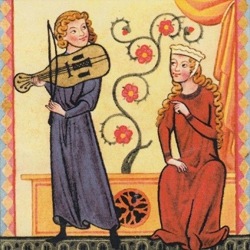
But soon his heated imagination knew no limits.
Adelaide, who was pleased to have had for him pleasures authorized by the use, was far from allowing criminal's ones. Although she was armed with the most imposing severity, Arnaud could not repress the movements of his passionate heart.
He composed another song in which he cries with a painful transport:
"I swim in desires; this is my element as water is for fish: but I will always desire in vain since I desire alone. The one I love is deaf to my wishes. We soften the lions and nothing weakens the rigor. I still support, without complaint, a state that overwhelms me. Could I indeed believe myself unhappy? I like and I desire. Love! if I speak thus of your troubles, what shall I say of your pleasures?"
However, Alfonso IV, who reigned in Castile from 1158 until 1214, was in love with the Countess of Béziers. If I tell you, Madame, that this powerful sovereign was jealous of a mere troubadour, you will not be surprised at all because you know that in this century the favorites of the Languedoc muses could aspire to the greatest princesses..
Alphonse demanded that Arnaud cease to see and sing Adelaide, and demanded that Adelaide forbid her to remain at court. The unfortunate lover received an order from the countess to stop celebrating her and to leave her. He retired to William VIII, lord of Montpellier. There, his passion is nourished by his regrets that he thus exhales in another piece of verse:
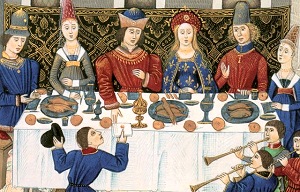
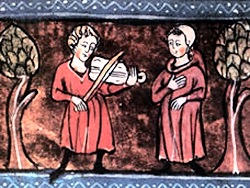
"Do not tell me that the soul is touched only through the eyes. Mine do not see the one I love anymore and I am only more strongly occupied with the good that I have lost. It has been possible to move away from his presence but my heart will remain eternally attached by knots that nothing will ever break ....
Fortunate places where she lives - he adds elsewhere - when will I be allowed to see you again! Will not I see anyone coming on that side? A shepherd who comes from his castle would be for me a man of importance.
May I be confined to a desert and meet her there! This wild place would keep me from paradise."
This expression of an unhappy lover demands indulgence. From this tender and sweet pain, the character of which is an enemy of reproaches, Arnaud soon passed into despair and spread himself in bitter complaints, sometimes against his enemies, sometimes against the one who, being the cause of his misfortunes, had abandoned him at the rigor of his fate.
"I do not care for anything on earth, he says, I have no more friends and I do not have to love anything anymore."
This reflection imperceptibly sent him off, and he ended his poetic career with a drama of about four hundred verses in which he recorded the maxims he proposed for a rule of conduct.
It is believed that he died in Montpellier before the Countess of Béziers who does not seem to have lived after the year 1201.
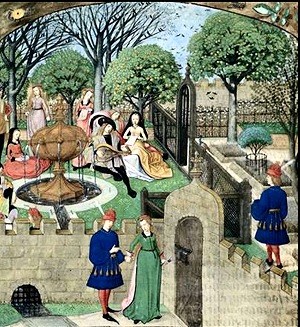
NB : It should be noted that a similar story was told by the storytellers of the 13th century:
It concerns a famous troubadour, Peire Vidal (1183-1204) who began his career at the court of Raymond V (the father of Adelaide):
"Peire Vidal fell in love with Lady Azalais de Roquemartine (1155-1210), native poet of Portiragnes and wife of Raymond-Geoffroi Barral (1150-1192), Lord of Marseille. Barral liked him more than any other man in the world and tasted more than anything else about his songs and his madness.
He rejoiced at the court given to his wife because he thought it a game. One day Peire Vidal knew that Barral was out and that Lady Azalais had remained alone asleep in her bed. He entered the room, approached his bed and took her in his arms, then kissed her. She awoke, saw Peire Vidal and began to shout. As soon ladies and damsels came running and Peire escaped. The lady ask for her husband and told him how this madman Peire Vidal had given her a kiss and that she wanted him to be killed.
Barral tried to make her reason heard and tell her that she should not see any harm as he was crazy. And Peire Vidal, for fear of her, left the country and went overseas where he composed many good songs reminiscent of the stolen kiss. Seeing this, Barral and Uc des Baux prayed so much the lady that she summoned Peire Vidal, pardoned him, received him with great joy, and gave him this stolen kiss."
Example of a love song "A chantar m'er de so q'ieu no volria", composed by Béatrice de Die (1135-1189)
(singer: Geneviève Judes) , found on Marcel Arnoux website.